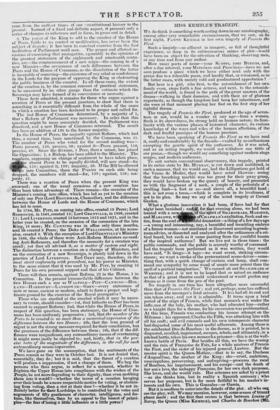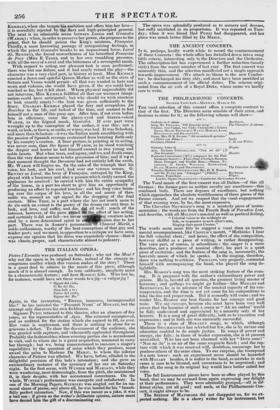MISS KEMI3LE'S TRAGEDY.
Ws do think it something worth noting down in our autobiography, among other very remarkable circumstances, that we saw, on its I first night, FANNY ICEMI3LE in her own tragedy of. Francis the First.
Such a tregedy—so affluent in imagery, so full of thoughtful experience, so deep in its subterraneous mines of plot—would have been an object for the attention of thinking, observing men, at any time and from any author. ..: .__ How many poets of name—your Scorn, your BYRONS, and, after a due interval, your MITFORDS and Paoersits—have we not seen produce a piece which we have either read only with the praise due to a tolerable poem, and hardly that, or witnessed, as in. the latter cases, with merely cold and goodnatured approbation I. -------1- But here is a girl, who first, to the astonishment of her own family even, steps forth a fine actress, and next, to the astonish- ment of the world, is found in the path of the great masters of the- drama—walking in their domains, and with their air of glorious superiority, as though the kingdom had beep her inheritance, and' she were at that moment placing her foot on the first step of her- rightful throne... .- -- - --- - The tragedy of Francis the First, produced at the age of seven- teen or not, would be a wonder at any age—from a woman. Such is its shrewdness, its strong hold on human nature, its fami- liarity with the various phases of historical character, its curious knowledge of the ways and wiles of the human affections, of the dark and fearful passages of the human passions.
We have been speaking of Francis the First as we have read it, coolly and comfortably by the fireside—exalted by no enthusiasm excepting the gentle spirit of the authoress. As it was acted, and as an acting tragedy, we would not withdraw one tittle of our praise,—though we would say something against modern stage usages, and modern audiences.
To suit certain conventional observances, this tragedy, printed in its entire state by Mr. MURRAY, is cut down and mutilated, in such a manner, that we would say, had the Lilliputians got hold of the Venus de Medici, they would have acted likewise : seeing that the breathing marble was too great for their puny grasp, they would have broken up the quarry of beauty, and presented ' us with the fragment of a neck, a couple of the pedestals of a swelling limb—a foot or so—and above all, a beautiful head t this is not even a torso,—which is complete in its loveliness, if not in its plan. So may we say of the acted tragedy at Covent Garden.
What a glorious innovation it had been, if farce had for that night been banished ; and* for that evening alone, we had been treated with a ne 'Of the spirit of SBAKSPEARE, MARSTON, and MARLOWE, Wi OfCHAPMAN'S exaltation, fresh and en- tire, from the soul NW 1 dramatist—a thing of a few days ago —a young and interesting, nay, a beautiful and trembling embryo of a future woman—not mutilated or dissevered according to green- room advice, or dissected and analysed after the ordinances of a cri- tical board, but such as it came panting from the youthful bosom of the inspired authoress ! But we live not in those times : the public commands, and the public is scarcely worthy of command - had the tragedy been performed as it was written, they would have said, " It drags—it lags—we want event, striking circum- stance; we want a stroke of the preternatural scene-driver—some- thing that, with a quick change of curtain and lamp, shall com- mand our sympathy by some wand of magic more potent than the spell of a poetical imagination." We cannot sit out SH AXSPE ARE or WEBSTER ; and it is not to be hoped that so mixed an audience as that of a great theatre could understand or would pardon any drama as it came from the pen of the poet. No tragedy in our time has been altogether more successful than that of Francis the First ; and yet, perhaps, none has suffered more from the manager's fatal scissors. It has had all its end and aim taken away, and yet it is admirable. It turns upon a brief period of the reign of Francis, while that monarch was under the influence of the lady, his mother, who had educated him—rather as a knight than for a throne, for his succession was problematical. At this time, Francis was conducting his insane attempt on the Milanese ; his opponent, Charles the Fifth, was attacking him with all his craft; and evil counsels and his own intemperate character had disgusted some of his most useful adherents. Among these is the celebrated Due de Bourbon : in the drama, as it is printed, he is disgusted, recalled, imprisoned, escapes, rebels, and ultimately, in a pitched battle, takes his own monarch a prisoner—this is at the well- known battle of Pavia. But besides all this, we have the wooing and the ruin of Fmneoise de Foix, for a while mistress of Francis the First, and the sister of his injured general, Lautrec. But the master spirit is the Queen-Mother,—that is to say, the Duchess d'Angouleme, the mother of the King: she—cruel, ambitious, unscrupulous, persevering, and unforgiving—procures the rectal of Bourbon, his imprisonment, and his escape—and the death of her son's love, the unhappy Francoise, for her own dark purposes. She loves, and she would rule. Her schemes are aided by a priest —as she thinks him, but in reality a Spanish emissary ; who serves her purposes, but is far more faithful to his master's in- terests and his own. This is Gonzales—or Garcia.
But it is needless to enter into the details of the plot . all who ca4 see the play, will. We may mention, however, some scenes of inured phant merit : and the first that occurs is that between Louisa of Savoy, the Queen (Miss KEMBLE), and Charles de Bourbon (Mr. KEMBLE), when she tempts leis ambition and offers him her love— it is scornfully rejected by the 'fiery and high-principled general. The next' is an admirable scene between Louisa and Gonzales (VV Alum) ; when, in order to preserve her power, she proposes to the priest, that he should poison the King's mistress, Francoise. Thirdly, a most harrowing passage of antagonizing feelings, in which the priest Gonzales breaks to an impassioned lover, Laval (G. BENNET), the forced unworthiness of his betrothed Francoise de Foix (Miss E. TREE), and in her own trembling presence, with all the envy of a rival and the bitterness of a revengeful monk. With respect to acting, our pleasant task is soon performed: there was but one failure, and it had nearly ruined the play—the character was a very chief part, in history at least. Miss KEMBLE enacted a fierce and spiteful Queen-Mother as well as the stars of Saturn and Venus would permit: all that was wanted in hate and scorn and violence, she would have given, if the eye could have reached so far, but it fell short. Where physical impossibility did not intervene, Miss KEMBLE fulfilled all that our warmest imagi- nation could have anticipated; but why should we wish nineteen to look exactly ninety ?—the hint was given sufficiently to the fancy. CHARLES KEMBLE played the fiery and scrupulous De Bourbon to the life, and looked of the time, and seemed to feel hiinself not a man of this puny age. After him, if not even before hini in efficieney, Came the glassy-eyed and brazen-voiced WARDE, as the feigned monk, Gonzales. If ever part were wrought up to the conception of the author, it was this: not a word, or look; or frown, or smile, or wince, was lost. It was Schedoni, and more thin Schedoni—it was the Italian monk smouldering with the passion of Spanish revenge restrained from bursting forth only by his country's caution. A finer picture, in painting or in acting, • was never seen, than the figure of WARDE, as he stood watching the despair and horror he had himself created in two young and noble hearts. But when tears, and agony, and wo, and death come, then the very dmnion Seems to take possession of him ; and if wa at that moment thought the Devourer had not entirely left the earth, Mr. WARDE will forgive us, for the sake of the triumph that his • voice, his look, and his cowl, had over our veteran senses. G. 'BENNET as Laval, the lover of Franeoise, outraged by the King, played with a buoyancy and also a passion which richly earned the applauses he received : he carried with him the entire sympathy of the house, in a part too short to give him an opportunity of producing an effect by repeated touches : and his deep voice boom, ing over the corpse' of his love, in all the sad music of thre- nodic wo, seemed an apt signal for the dropping of the final • curtain: 'Miss TREE, in a part' where she -has not much more to do. (to. such an extent is the poetry of the drama cut out) than to look; and love, and' suffer; and die, all well : much of the interest, however, of the piece d ,the effect of her acting, .and certainly it did not fail—we never "- creature actu- . ated by a more determined spirit to stice due to her part. There was in ABBOT'S personatio Clement Margt, a noble enthusiasm, worthy of the best conceptions of that gay and • tender poet; and we must, in opposition to a critique we have seen, ,express our opinion that his dress was exquisitely chosen—that it was chaste, proper, and characteristic almost to pedantry.



























 Previous page
Previous page